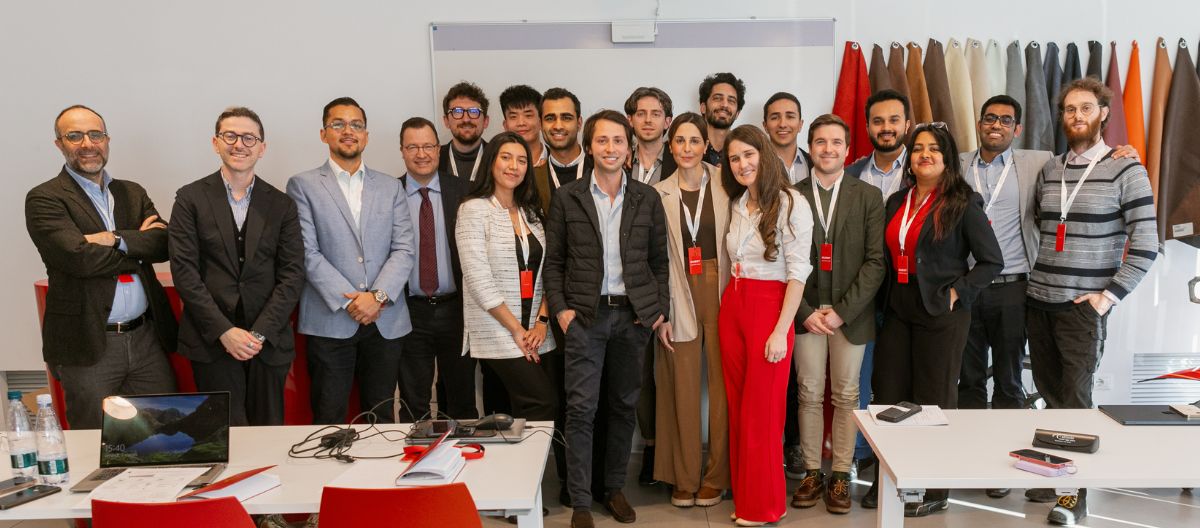
Company visit at Ferrari: the experience of Global MBA in Supercars, Superbikes and Motorsports students
21 March 2025Visiting Ferrari is a unique experience for anyone passionate about automotive and motorsport. For the students of the Global MBA in Supercars, Superbikes and Motorsports at Bologna Business School, this opportunity was far more than a simple visit: a full immersion into an icon of engineering and automotive innovation.
Marco Negri and Moksh Khosla, participants in the program, share their insights and the lessons learned during this experience, coordinated by Dennis de Munck, Head of Employer Branding and University Partnerships at Ferrari.
Presenting a project at Ferrari: an exciting challenge
Engaging with Ferrari means measuring oneself against a company where excellence is the only acceptable standard. The experience also included the opportunity for participants to present their project work, under the supervision of Dennis de Munck, Head of Employer Branding and University Partnerships at Ferrari, Marcello Russo, Director of the Global MBA, and Federico Munari, Industry Leader of the track.
“Presenting our project at Ferrari was not only an exciting challenge, but a dream come true,” says Marco. “The hardest part was getting into the Ferrari mindset, where failure is not an option. Every detail of our work had to reflect the exclusivity and quality that define the brand.”
For Moksh, the most intense moment was the final presentation in the Red Room: “We didn’t just experience Ferrari—we interpreted it through our own eyes. Presenting in that room, surrounded by iconic elements like tyres, steering wheels and mirrors, pushed us to think and act like Ferrari people. The greatest challenge? Achieving excellence within a limited time frame.”
The feedback received highlighted two key aspects: that having data is not enough—one must understand which data solves which problem—and that perfection must be pursued by integrating innovative ideas while always remaining aligned with the brand’s core values and financial sustainability.
Efficiency, innovation and passion: the Ferrari model
Observing Ferrari’s production lines up close offered students a privileged perspective on an industrial model that has made the brand a global symbol of excellence.
“I was impressed by the efficiency and perfect synchronization of the production processes,” says Marco. “The obsession with excellence, the sense of belonging to the brand’s history, and the attention to innovation and sustainability are principles that could be applied to many other sectors, especially in luxury.”
Moksh underlines the coherence between the needs of racing and the production process: “Each car spends fixed number of minutes at each workstation. The quality remains consistent. Repetition makes the workflow smoother. But it’s also the details that stand out: large windows, trees, natural light. Everything contributes to a sense of well-being that reflects on productivity. And then, the passion! You can feel it everywhere. An engine displayed with its history, a racing car between offices—tangible signs of a strong and shared culture.”
Memory as a lever of brand identity
A particularly emotional moment was entering the Racing Museum, where Ferrari’s racing history is preserved. “I firmly believe that passion is the foundation of every winning team,” explains Marco. “In the museum, you immediately feel that energy. Each vehicle is presented as a technological masterpiece, an almost living entity created to push the boundaries of what’s possible. The atmosphere was simply inspiring.”
Moksh adds a personal note: “The names of the drivers engraved on the Wall of Champions, the miniature cars telling the story of every season—Ferrari forgets nothing. It does not only celebrate victories, but safeguards history with respect. It is a call to honor the past in order to build the future.”
Connecting theory and practice: the value of company visits
Experiences like this represent a fundamental bridge between classroom learning and real-world business. “Company visits allow students to understand in concrete terms the working environment they aspire to,” says Marco. “When they take place in historic companies like Ferrari, their value is even greater: you breathe in their legacy and find new motivation to pursue your professional goals.”
Moksh also stresses the importance of seeing what you study come to life: “Visualization is an essential part of the learning process. Only by entering Ferrari did I truly understand how the environment itself shapes people. This kind of experience helps you answer a fundamental question: what do I want for myself?”
An experience at Ferrari that will remain vivid in the memory of the students, inspiring them to always aim for excellence, just as taught by the Cavallino Rampante.
